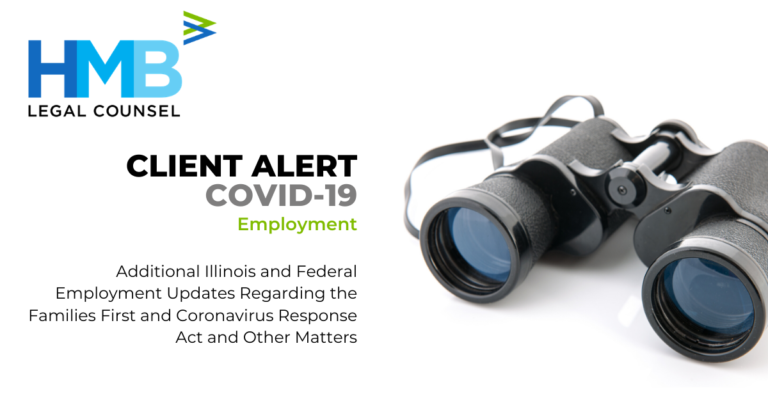Illinois Workers' Compensation Commission Updates
After initially voting 9-0-1 to approve a new emergency rule that created a rebuttable presumption that the workplace is the cause of an employee contracting COVID-19 to the extent such employee works for an essential business, the Illinois Workers’ Compensation Commission (the “Commission”) met yesterday, April 27, to formally withdraw the rule. The Illinois Manufacturers’ Association and Illinois Retail Merchants Association (collectively, the “Associations”) filed a lawsuit last week challenging the Commission’s authority to issue such a rule. On April 24, the judge issued the Temporary Restraining Order on the grounds that the Commission exceeded its rulemaking authority. Although the Associations were successful in getting the emergency rule withdrawn, the Associations expect legislation to be filed in the state’s General Assembly. Other states have already passed a rebuttable presumption, although such rules have been limited to health care workers and first responders.
Read MoreIllinois WARN Act Updates
The Illinois Worker Adjustment and Retraining Notification (“WARN”) Act requires private employers with at least 75 full-time employees to give workers and state and local government officials 60 days notice of a plant closing or mass layoff. In light of the COVID-19 pandemic, the Illinois Department of Labor (“IDOL”) will provide employers additional time to make the relevant notifications. Employers seeking more time will need to make a written request to the IDOL explaining why additional time is required. If the request is approved, the employer must provide as much notice as possible.
Families First Coronavirus Response Act (“FFCRA”) Updates
As previously mentioned, the U.S. Department of Labor (“DOL”) issued temporary regulations (the “Rule”) to implement the FFCRA. On April 10, 2020, the DOL issued an amendment to clarify certain matters, including the interaction between pre-existing employee benefits provided by the employer and benefits employees are entitled to under the FFCRA.
The DOL also recently posted additional guidance in response to questions that it has received related to the implementation of the FFCRA, including regarding:
- When you can take expanded family and medical leave or paid sick leave because you are subject to a quarantine or isolation order, or to care for a child or another individual;
- How to pay employees who have irregular work hours;
- How employers should count joint or common employees; and
- The interaction between leave under the FFCRA and workers’ compensation and leaves of absence.
The guidance clarifies the interplay between employer-provided paid leave and paid sick leave and expanded family and medical leave under the FFCRA. Employers cannot require employees to use employer provided paid leave before paid sick leave under the FFCRA, nor can employees be required to use employer provided paid leave concurrently with paid sick leave under the FFCRA. However, employers may require employees to take employer provided paid leave concurrently with expanded family and medical leave under the FFCRA. In such event, the employer is required to pay the employee the full amount to which the employee is entitled under the employer provided leave.
Employers should take the time to review their employment policies, including any Family and Medical Leave Act specific policies, to ensure that such policies are flexible and consistent with federal, state and local laws.
The Occupational Safety and Health Administration (“OSHA”) Releases COVID-19 Related Enforcement Guidance
On April 10, 2020, OSHA issued interim guidance to its Compliance Safety and Health Officers regarding how OSHA will enforce its occupational injuries and illness recording and reporting regulations (see 29 CFR Part 1904) (the “Reporting Regulations”) in connection with COVID-19 cases.
Under the Reporting Regulations, employers must record a case of COVID-19 if (1) it is a confirmed case, (2) the case is work-related, and (3) the case involves at least one general recording criteria under 29 CFR Section 1904.7 (e.g., death, days away from work). However, in communities where there is community transmission, OSHA will not enforce the recording and reporting obligations under the Reporting Rules unless (1) there is objective evidence that the COVID-19 case is work-related and (2) such evidence was reasonably available to the employer. Employers in the healthcare industry, emergency response organizations, and correctional institutions, however, must continue to make work-relatedness determinations.
This guidance is expected to be in place during the entirety of the COVID-19 public health crisis.
HMB Legal Counsel will continue to provide updates as the situation evolves. The ongoing issues related to the spread of the Coronavirus (COVID-19) have had and will continue to have a significant impact on individuals, families, businesses and markets. Visit our collection of resources providing guidance during these fast-changing circumstances. Please reach out to your lead team member to answer specific questions.



